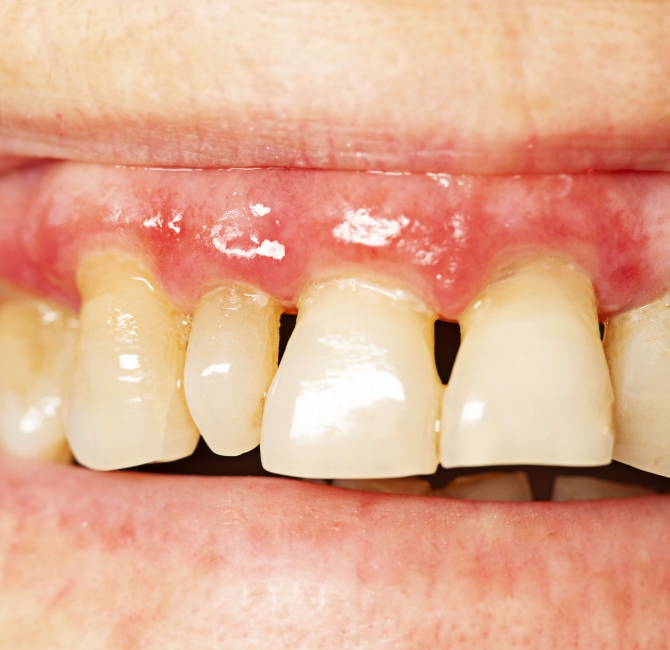Frequency of tooth brushing was associated with risk of new-onset diabetes in a large retrospective study.
In 188,013 individuals followed for a median of 10 years, those who brushed three or more times a day were 8% less likely to develop diabetes (HR 0.92, 95% CI 0.89-0.95, P < 0.001), compared with those who brushed less frequently.
Additionally, reported Tae-Jin Song, MD, PhD, of Seoul Hospital in Korea, and colleagues, having periodontal disease increased diabetes risk by 9% (HR 1.09, 95% CI 1.07- 1.12, P < 0.001), and having many missing teeth (15 or more) increased the risk by 21% (HR 1.21, 95% CI 1.09-1.33, P < 0.001). These trends were stronger in individuals younger than the median age of 52 compared with those who were older.
“Frequent tooth brushing may be an attenuating factor and the presence of periodontal disease and an increased number of missing teeth may be augmenting factors for the occurrence of new-onset diabetes,” the team wrote online in Diabetologia. “Improving oral hygiene may be associated with a decreased risk of occurrence of new-onset diabetes.”
Better oral hygiene could become part of an overall diabetes prevention plan, the researchers suggested. “Currently, several preventive strategies for new onset diabetes have been suggested that include controlling factors related to a healthy lifestyle, such as maintaining proper weight and waist circumference, increasing regular exercise or physical activity, practising healthy dietary habits, and undergoing regular physical examinations for identifying risk factors. However, disease-modifying drugs and preventive methods for occurrence of new-onset diabetes are still lacking.”
The link between oral health and diabetes is most likely inflammation, Song and co-authors speculated, explaining that periodontal disease is a chronic inflammatory disease triggered by bacteria. Ulceration in periodontal pockets provide oral bacteria easy access to systemic circulation. The systemic inflammatory responses to these bacteria, and the release of inflammatory mediators including pro-inflammatory cytokines, could impair glycemic control.
“It is therefore plausible that systemic and chronic inflammatory reactions derived from periodontal disease or poor oral hygiene may impact the occurrence of new-onset diabetes,” the researchers said.
Study details
For the study, the investigators collected data from 2003 to 2006 on 188,013 individuals from the National Health Insurance System-Health Screening Cohort in Korea. The median age of participants was 52, and 58% were men.
Study participants had complete data for demographics, past medical history, and oral hygiene indicators. Oral hygiene behaviours such as tooth brushing were self-reported during oral health check-ups. The number of missing teeth was ascertained during examination.
The researchers determined the incidence of periodontal disease and new-onset diabetes with international disease classification codes and insurance claims records. Periodontal disease was present in 17.5% of individuals. Approximately 43% reported brushing their teeth at least three times a day.
Over a median follow-up of 10 years, 16% of participants developed diabetes. In examining associations between gum disease or teeth brushing and diabetes, the team controlled for variables including age, sex, socioeconomic status, alcohol consumption, physical activity, body-mass index, smoking, hypertension, and dyslipidemia.
A subgroup analysis compared individuals age 51 and younger with those 52 and older. In the younger group, brushing twice a day was linked with a 10% lower risk of diabetes (HR 0.90, 95% CI 0.85-0.95), and brushing three or more times a day was associated with a 14% risk reduction (HR 0.86, 95% CI 0.81-0.91). In the older group, there was no significant difference in diabetes risk between those brushing twice a day and those brushing once or not at all. However, brushing three or more times a day was associated with a 7% decreased risk (HR 0.93, 95% CI 0.89-0.97).
“Although it is difficult to give a clear reason for this relationship, we assume that genetic factors, stress, and many other general diseases may have different effects on periodontal disease, oral hygiene indicators, and new-onset diabetes depending on age,” Song and co-authors wrote.
They noted that because the study included only Koreans, the results might not be generalizable to other ethnicities. In addition, brushing habits were self-reported and therefore subject to recall bias, and the study lacked information on the severity of gum disease and did not distinguish between type 1 and type 2 diabetes.



